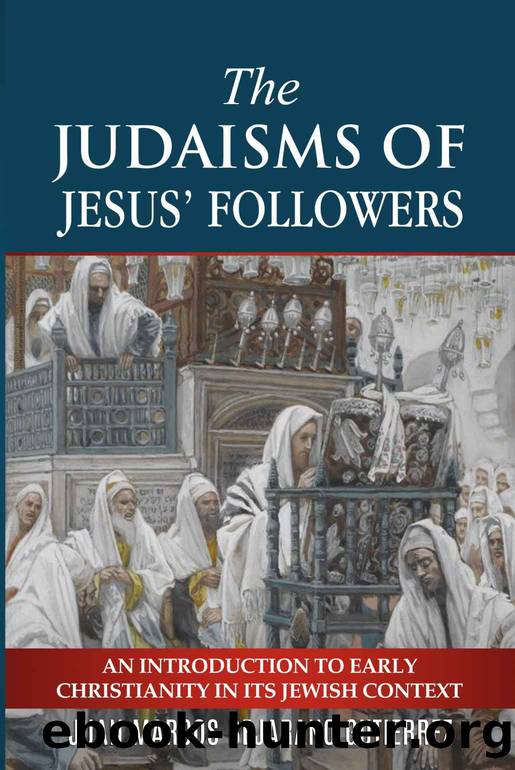The Judaisms of Jesusâ Followers by Juan Marcos Bejarano Gutierrez

Author:Juan Marcos Bejarano Gutierrez [Gutierrez, Juan Marcos Bejarano]
Language: eng
Format: epub
ISBN: 9781719941150
Publisher: Yaron Publishing
Published: 2018-09-02T04:00:00+00:00
Neither Abidan nor Nitzraphi is likely of Aramaic origin. They do not appear to be Hebrew words either. They are likely hybrids and contain some polemic implication. Abidan may be connected to the root abad, i.e., to destroy, which in turn may be connected to the term Abaddon (Revelation 9:11). Nitzraphi is possibly connected with the word Notzri, Nazarene. The form of the word may suggest verb construct referred to as niphal. This verb form may link it to the root tzaraph, i.e., to unite. This may infer that the Be Nitzraphi refers to a House where Nazarenes assemble, though the evidence is inconclusive. The term Be Abidan is mentioned in Shabbat 152a and Avodah Zarah 17b. In both of these cases, someone is asked why he or she do not come to the Be Abidan.
The term Be Abidan may also infer a court or a place for philosophical discussions. There are indications that buildings of this were erected in various cities in Palestine. Several Rabbinic texts, e.g., Bechorot 8b, Kohelet Rabba 1.7, indicate that debates between rabbis and possibly philosophers occurred in them. These philosophical debates may have included disputations of a religious tone that may have included Jews who supported Jesusâ messianic claims.
The Be Nitzraphi was a worse place than the Be Abidan. Moreover, the reference to wine likely indicates that it served as a possible gathering for religious purposes. It is unlikely that blatant idolatry would have been practiced there since no rabbi would have entered such an environment. The Be Nitzraphi is arguably a synagogue or meeting place of Jews who followed Jesus. While relations between Jews who supported Jesus and the greater Jewish community often declined substantially, there are cases of rabbis, such as Abahu, who maintained close contact with Jews who supported Jesusâ messianic claims. Rabbi Saphra may have been appointed by such Jews in Caesarea to be their teacher on the recommendation of Rabbi Abahu.
Download
This site does not store any files on its server. We only index and link to content provided by other sites. Please contact the content providers to delete copyright contents if any and email us, we'll remove relevant links or contents immediately.
| Haggadah | Hasidism |
| History | Holidays |
| Jewish Life | Kabbalah & Mysticism |
| Law | Movements |
| Prayerbooks | Sacred Writings |
| Sermons | Theology |
| Women & Judaism |
The Power of Habit by Charles Duhigg(3117)
Man's Search for Meaning by Viktor E. Frankl(2662)
Mckeown, Greg - Essentialism: The Disciplined Pursuit of Less by Mckeown Greg(2413)
MOSES THE EGYPTIAN by Jan Assmann(2410)
Devil, The by Almond Philip C(2322)
The Complete Dead Sea Scrolls in English (7th Edition) (Penguin Classics) by Geza Vermes(2269)
Unbound by Arlene Stein(2266)
I Capture the Castle by Dodie Smith(2028)
Schindler's Ark by Thomas Keneally(1869)
The Invisible Wall by Harry Bernstein(1797)
The Gnostic Gospel of St. Thomas by Tau Malachi(1779)
The Bible Doesn't Say That by Dr. Joel M. Hoffman(1674)
The Secret Doctrine of the Kabbalah by Leonora Leet(1600)
Political Theology by Carl Schmitt(1568)
The Jewish State by Theodor Herzl(1526)
A History of the Jews by Max I. Dimont(1517)
The Dead Sea Scrolls Bible by Martin G. Abegg(1500)
The Book of Separation by Tova Mirvis(1479)
Oy!: The Ultimate Book of Jewish Jokes by David Minkoff(1360)
